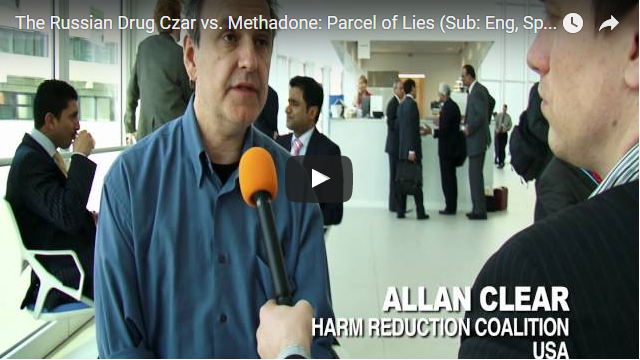The Russian drug czar claims opiate substitution does not work – watch our movie!
HCLU’s video advocacy team filmed the press conference of the Russian government delegation at the Commission on Narcotic Drugs this year – our movie challenges the Russian drug czar’s statement on opiate substitution treatment. Please watch and share the video!
A year later we attended the CND again (the 54th session) where we discovered that the Russian delegation had organized a press conference on the same subject: the fight against heroin production in Afghanistan. In the press conference, Mr. Ivanov tried to convince journalists about the benefits of a radical Russian plan to eliminate opium production in Afghanistan in 5 years. However, most journalists were not interested in this highly dubious plan to eradicate opium fields in Afghanistan and instead focused on the domestic drug policies of the Russian government. Some of the most most pertinent questions were: why does the Russian government still criminalize and imprison drug users instead of providing them with effective, science-based treatment; and why is OST illegal in a country with a very high rate of HIV infections among injecting drug users?
Mr. Ivanov’s answer was disappointing again: he said there is no evidence that methadone substitution is effective and to the contrary, there is evidence that it leads to an increase in overdose deaths among drug users. It is not surprising that Ivanov denies the scientific consensus on the effectiveness of OST. This is nothing new; Russian government officials always turn to lying when there is no other escape from inconvenient questions. The real question is why the international organizations, especially the UN agency on drugs (UNODC) is not more vocal when it comes to Russia and methadone? Methadone is on the List of Essential Medicines of the WHO, and OST is supported by all relevant UN bodies as a crucial tool in preventing HIV and overdoses. Yet still, the outrageous statements of the Russian government on OST remain unchallenged and nobody speaks up to defend the rights of vulnerable people to have access to effective and humane treatment.
The new director of UNODC, Mr. Yuri Fedotov, was present at the press conference as well, and we asked him why UNODC cannot do more to push the Russians. His answer was just as disappointing as Ivanov’s: rather than calling on the Russian government to accept scientific evidence on methadone, he said this question is in the ownership of the member states. So according to the director of the UNODC, it is in the hands of the Russian government to deny evidence and to let thousands of people die unnecessarily. Fedotov’s position is even more unsatisfactory if you consider that in his opening speech he was talking about the need for rejuvenating the UN drug conventions (e.g. to put public health to the center of drug policies).
We suggest to Mr. Fedotov to start rejuvenating the Russian position on methadone first!
We promise that HCLU will ask the question about opiate substitution treatment again and again from the Russian and the UN drug czar until we got an adequate answer.
Posted by Peter Sarosi




